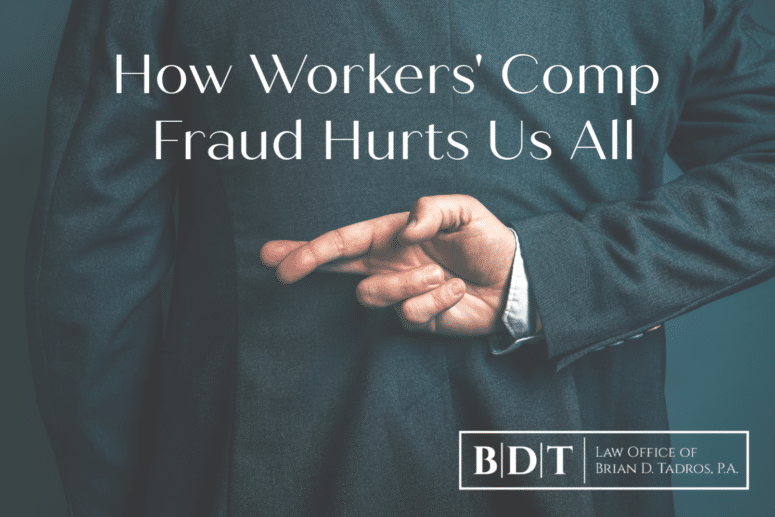
For some people, the temptation of collecting a portion of their salary while not having to work is too great a temptation to pass up. They may reason that their employer (more accurately, the insurance company) has enough money to spare and that taking a little “vacation” isn’t really hurting anyone.
But workers’ comp fraud is far from a victimless crime.
In this article, I’ll discuss what workers’ comp fraud is and how it hurts everyone (not just the insurance companies).
What is Workers’ Comp fraud?
Workers’ comp fraud is defined as making a false, incomplete, or misleading statement in pursuit of workers’ compensation benefits.
An estimated 1-2% of workers’ compensation claims are believed to be fraudulent. It may not sound like a lot, but the problem is serious enough to warrant the existence of the Florida Bureau of Workers’ Compensation Fraud, which reported successfully prosecuting 335 cases of misrepresentation in the 2017-2018 fiscal year.

Known in legal circles as “misrepresentation,” workers’ comp fraud not only hurts the insurance companies, they also affect the employers who pay the premiums and make the process of filing a claim more complicated for workers with legitimate, authentic cases.
Before we go into this, however, let’s look at some of the most common methods of workers’ comp fraud.
Types of Workers’ Comp Fraud
While there can be as many types of lies as there are people to tell them, most workers’ comp fraud falls under four general categories:
- False Claims – faking an injury that never happened
- Withheld Information – failing to divulge relevant information that may negatively affect your claim
- Exaggerated Claims – representing your workplace injury as more serious than it really is
- “Double Dipping” – collecting workers’ compensation benefits from one job while continuing to work at another one
Note that the key question in workers’ comp fraud cases is “Was there intent to deceive?”
Forgetting to divulge relevant information (because it occurred 30 years ago) is a far different scenario than deliberately withholding information so you can receive a bigger check.
If a judge determines that workers’ comp fraud has occurred, all workers’ compensation benefits will be denied and the injured worker will likely be prosecuted by the state and if successfully prosecuted, found guilty of a third-degree felony.
Having said that, insurance companies are typically hesitant to deny all benefits based on misrepresentation unless it is a clear case of fraud. If benefits are denied (because they are believed to be fraudulent) and the injured employee fights the decision and wins, the insurance company will have to pay the employee’s attorney’s fees and costs, even if no benefits are awarded to the injured worker.
What Does Workers’ Comp Fraud Look Like?
It can be difficult—not to mention awkward—to determine whether an employee’s workers’ comp claim is false or exaggerated, but there are a few common red flags to watch out for.
- Time of Injury – The alleged injury occurs on Friday afternoon but is not reported until Monday morning
- Extensive Claim History – The employee has a number of past workers’ comp claims
- No Witnesses – There were no witnesses to the employee’s accident or injury
- Conflicting Statements – The employee’s story changes or conflicts with the initial medical report
- Avoids Medical Treatment – The employee refuses to seek medical treatment
- Difficult to Contact – The employee is difficult to get in contact with
- Change of Employment – The incident occurred prior to a job loss, strike, or the end of a large project or seasonal work period
- Reporting Delay – The employee does not report the injury within a reasonable amount of time, with no explanation for doing so

It is important to note that this is simply a list of potential red flags and the existence of one of these warning signs does not automatically indicate that workers’ comp fraud is taking place.
Injured at Work In Florida?
Employer Fraud
Injured (or non-injured) employees are not the only ones capable of committing workers’ comp fraud. Employers often make false statements to avoid having to pay workers’ comp premiums.
In Florida, workers’ comp insurance is required based on how many employees a business has. Construction companies must have workers’ comp insurance if they have even one employee, while other businesses must carry it once they have at least four employees.
The reason behind this is the level of risk that the insurance companies must take on. If an industry carries a higher level of risk (a roofing company vs. an accounting firm), the workers’ comp insurance premiums will need to be higher to compensate for the risk of having to pay out more benefit claims.
To get out of paying these higher claims, shady employers often misclassify workers (claims they are independent contractors or lies about the type of work they do), pay employees “under the table” in cash, or under-report payroll.
All are efforts to achieve lower mandated workman’s compensation premium costs. This provides unfair competition for companies in the marketplace, with some paying their fair share and some cheating the system to achieve lower costs.
What’s the Big Deal?
For some reason, workers’ comp fraud has a reputation of being a victimless crime.
People reason that insurance companies have plenty of money to spare (and are perfectly willing to part with it), so what’s the big deal with stretching the truth a little bit?
As it turns out: plenty.
Insurance companies are just like any other business. At the end of the day, they want to make a profit. The more claims they pay out, the more they have to take in to keep the same profit margins.

And when fraudulent workers’ comp claims increase, so do everyone’s premiums. Recent estimates suggest that workers’ comp fraud costs an estimated $6 billion a year.
Additionally, there is the strain that fraud puts on legitimately injured workers. As fraud increases, more efforts must be taken to verify claims, which makes the process more difficult and harrowing for everyone involved.
Workers’ comp fraud—either on the side of the worker or the employer—is never OK. It hurts our economy and legal system overall.
If you suspect fraud in a workers’ compensation case by a Florida employer or employee, call the state’s hotline at 800-378-0445, or file your complaint here.
Conclusion
Workers’ compensation is a highly beneficial system designed to provide sick and injured employees with a safety net in the event of an injury. But workers’ comp fraud takes advantage of a good thing.
If you have been injured at work and are worried that you’re not receiving the benefits you are entitled to, don’t resort to fraudulent claims! Working with a workers’ compensation attorney will ensure that you have an educator and advocate on your side who will get you the benefits you deserve.
Schedule a free consultation today so we can find out how we can help you.

